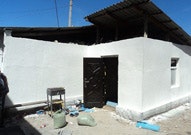Beyond the Single Solution of Institutionalization in Kyrgyzstan
By Neil Tobin

Fifty-five-year-old Gulunara lives close to the city center in Bishkek, Kyrgyzstan, in a modest two-room home. She has a mental health problem and has spent most of her life in and out of psychiatric institutions. “It affected my ability to cope with daily activities as I became excessively anxious and sometimes had mood swings,” She explains. “That is why my husband abandoned me and my daughter. All we had to survive was my disability benefit of 1500 Kyrgyzstani som [$31] per month.”
Her sister had been supportive of Gulunara until she showed signs of being unwell, after which they knew no other option but to commit her to a psychiatric institution. There she was placed in a room of 10–15 people with different mental health problems. She recalls, “The institution looked very welcoming from the outside… with a nice garden and flowers. But once inside we were physically beaten by the attendants, as if they could beat the illness out of us.” Terrified and vulnerable, she complied with all the demands of the institution staff including being tied to the bed. “They said it was for my own safety,” she states flatly. She speaks with the strange sense of inevitability that typifies the experience of most people with mental health problems in Kyrgyzstan.
Approximately 68,000 people have mental health problems in Kyrgyzstan. The health care system provides a single solution: long-term in-patient care in large, archaic psychiatric institutions. There are three state psychiatric institutions in Kyrgyzstan. They are more warehouses than care facilities. People are locked up and often left to endure appalling segregation, deprivation on all levels, and emotional and physical abuse.
Following several reports of human rights violations, overcrowding, lack of adequate food, water, and heating in institutions, the Government of Kyrgyzstan attempted to reform the mental health system by moving away from institutions to more localized community-based care. Strategies for reform were articulated in the National Program "Kyrgyz Republic population’s mental health for 2001-2010." However, the reforms remain largely on paper. Despite the fact that community-based care produces better outcomes, promotes human rights and is more cost-effective, there have been no significant state contributions towards home-based psycho-social services, supported housing and/or employment for people with mental health problems. While the government cites inadequate funding and lack of trained mental health professionals for the slow shift towards community-based mental health care, government financing for mental health care is almost exclusively allocated to state psychiatric institutions. And reforms have been met with strong resistance from those benefiting from the existence of institutions.
A particularly disconcerting aspect of Gulunara’s experience is the patient’s total lack of decision-making rights with respect to the type of support or treatment they receive. No choices or alternatives are offered; the single solution is institutionalization. People are repeatedly sent away to psychiatric institutions unsure of how long they will stay and once inside, they are invariably prescribed a concoction of medications without their consent or any information.
Like most others, Gulunara believed that hospitalization was the only way for her to receive the support she needed to help her recover, even if it meant being locked away from society. Then in 2007, she came into contact with a local NGO, Family and Society, whose multi-disciplinary team of psychiatrists, psychologists and social workers, offered her an alternative solution focused on empowerment and social inclusion. Family and Society aims to reduce the number of unnecessary re-admissions to psychiatric institutions by providing an outpatient assistance program and home-based psycho-social support to people with mental health problems and their families.
Six years ago Gulunara was heavily medicated with antipsychotics and on the verge of another admission to a psychiatric institution. With holistic support in the community she avoided hospitalization and started to receive psycho-social therapy at the outpatient clinic. Gulunara was also supported in her home with her daily needs, from paying bills to finding employment.
Today Gulunara has a full time job. She no longer needs to take medication and has not been inside a psychiatric institution for over five years. Recently she became the proud grandmother of little Arena, who Gulunara says “brings me joy every day.” If it were not for Family and Society’s support to Gulunara and her daughter Adele, Arena would have been sent to a boarding home and Gulunara’s involvement with her family and community would have been very limited; if they ever got to see her at all. Worse still, her condition could have deteriorated. Fortunately for Gulunara there is an alternative to the single solution of institutionalization. The challenge in Kyrgyzstan is to make that alternative a real choice for all who need it.
Established in 2007, with support from the Open Society Mental Health Initiative, Family and Society is a Bishkek-based NGO that provides services to 63 families.
Until July 2013, Neil Tobin was a program officer with the Open Society Mental Health Initiative.
